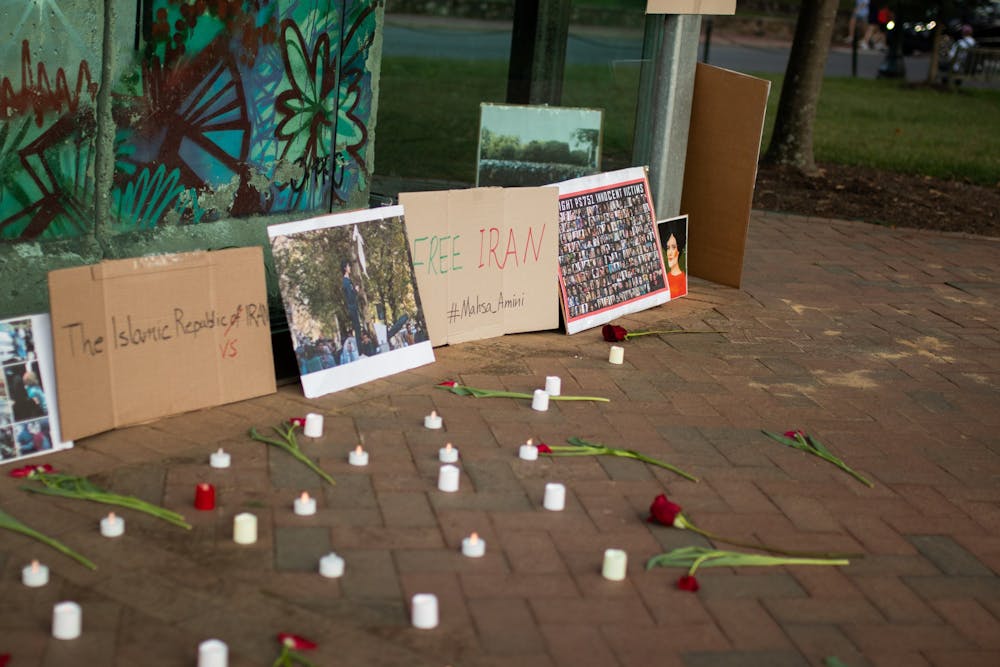Iran is a beautiful country filled with cold mountains, hot deserts, gorgeous valleys and lakes that scatter the land. Iran has a long, storied history. Thousand-year poems originating from Iran have had a lasting impact to this day. The foundations of many scientific and mathematical fields and even forms of bureaucracy and administration still used today were built in this country. Iran is ancient, like an old man in the Middle East. Sometimes, I think that is why it is Iran’s youth who suffer the most.
When my mother was 15, she walked past the American Embassy in Iran, wondering why people were crawling up the walls. The American Hostage Crisis had started, and life had officially changed. When my mother was 16, she went out onto the streets to speak her mind and was arrested. When my mother was 17, her cousin was tortured, executed and buried within five days. They found his acceptance letter from Harvard after his death. He did not want to leave the country that he loved and died for. That same year, she saw her best friend Maryam walk to her death — she was executed by the regime. There was nothing she could do. When my mother was 18, she was released from prison to a family that had been torn apart by the regime, still trapped in a country that wanted her dead. In the last month, we have seen this story repeated again and again.
When Siavash Mahmoudi was 15, he was shot. When Sarina Esmailzadeh was 16, she was beaten to death. When Nika Shakarami was 16, she was arrested, tortured and buried in an unmarked grave over the course of 10 days. Sept. 16, when Mahsa Amini was 22, the Regime’s Morality Police beat and killed her for the crime of wearing a hijab too loosely. She will never get any older. Since then, protests have engulfed Iran, and the Iranian Regime has been viciously killing more and more protesters every day — massacring them. Oct. 2, Sharif University — home to the brightest minds in the world — was besieged by the Iranian Regime and its students were culled simply for speaking their minds. Their parents and family have been silenced and threatened without hope for justice.
40 years have passed since my mother was a child, and we have seen this story repeat over and over again. Iran’s youths continue to suffer and die in the name of freedom as the world looks on and welcomes their butchers. Why should Ebrahim Raisi be allowed in New York as part of the United Nations when he has been murdering the soul of Iran since my mother was in prison? Why are children of Mullahs allowed in the United States, studying in top schools and staying in luxury apartments funded by the money bled out of Iranians who can only dream of such freedom? Why does the world legitimize and fund this government of horror?
Iran, for the past half of a century, has been ruled by a regime that has done all it can to destroy its own citizens. It is ironic that a country that created the first bill of rights now constantly denies its people those very rights. The people of Iran are being arrested, tortured and murdered for expressing their need for basic human rights. Look at Kurdistan, Sharif and Zahedan. Acknowledge the victims of this regime and the force used against them, the hundreds dead and the thousands arrested all in one month. Despite these atrocities, the people have not stopped protesting — they cannot. In solidarity, Iranians abroad, including myself, have been going out on the streets to bring awareness, but we are not at risk for death— we are simply risking the ability to ever go back to Iran.
I keep seeing news sites attributing these protests to economic issues and downplaying the current movement. They always call it a protest and never what it actually is. This is a revolution. The people of Iran have been living this reality for years. They have lived with their activists, artists and children being murdered for daring to ask for freedom. This is a revolution because if it does not change the regime at its core, then they will all die. This is a revolution because the people of Iran are tired of being killed by their own government. This is a revolution because they deserve to live their lives, hold their partner’s hands, show their hair and be themselves.
I ask that we, the students and faculty of the University, stand against the inhumane treatment of the men and women of Iran and that we speak up and elevate their voices. I ask that University President Jim Ryan release a statement in solidarity with the students in Iran who are being arrested, tortured and murdered for doing the same things we do at the University every day. I ask that the statement explicitly condemn the Islamic Republic of Iran for its crimes against humanity. I ask everyone to educate themselves on what is happening — this will lead to a change that will have a worldwide effect. Condemn the Iranian Regime for what they have done and bring their injustices to light. The Iranian regime does not want our eyes. That is why it is our duty to watch and share. Post, protest and petition. Let the people of Iran be acknowledged. They matter because they are us. Do not let them die silently. Do not let the Islamic Republic win. Iranian people will be free.
زن زندگی آزادی
Women, Life, Freedom
Neikey Panah is a fourth year student in the McIntire School of Commerce. She can be reached at opinion@cavalierdaily.com.
The opinions expressed in this column are not necessarily those of The Cavalier Daily. Columns represent the views of the authors alone.







